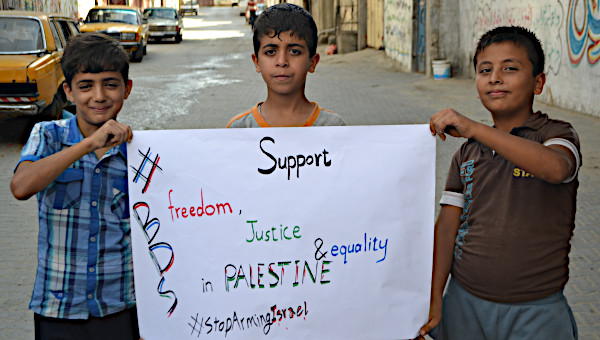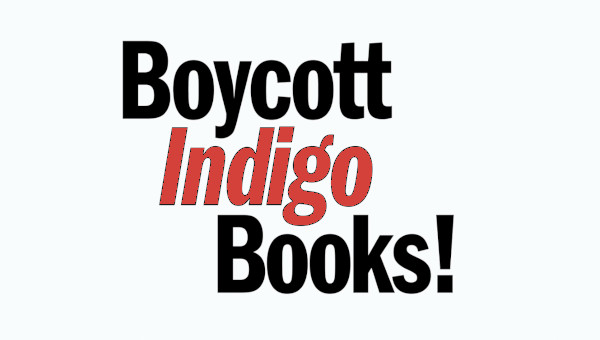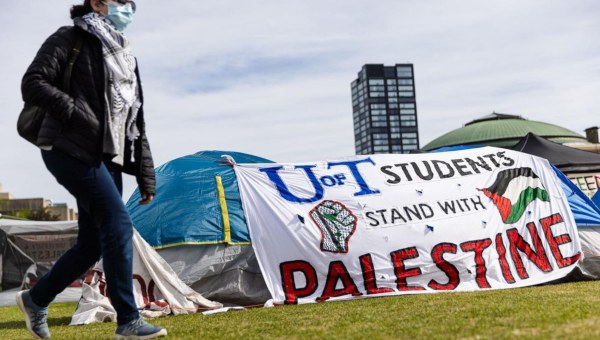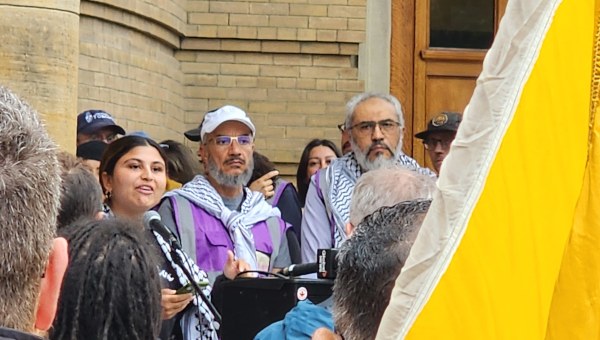A View From Toronto – A Hub of ‘Israel Delegitimization’
As a Palestinian refugee, the city of Toronto has always been a place of exile to me. I usually think of it as a large (rather cold) waiting room on my way back to Haifa where my grandparents were born. However, following the publication of a recent report by the prominent Israeli think-tank, the Reut Institute, I felt some pride for my adopted city.1 The Reut Institute declared Toronto a “hub of Israel delegitimization” and that the growing campaign calling for Boycott, Divestment and Sanctions (BDS) against Israel had become a “strategic threat.” The report confirmed to those of us involved in the BDS movement that our work was not in vain. The tireless work of many people around the world to build an effective movement to challenge Israeli apartheid was beginning to pay off. The aim of this article is to look at the key arguments of the Reut Institute’s report and to use them to interpret the response to the recently-concluded Israeli Apartheid Week (IAW), held in Toronto (and also started there) and numerous cities across Canada and the world.
Delegitimization Network
The premise of the Reut Institute Report is that there is a Resistance Network (made up of groups like Hizbullah and Hamas) and a Delegitimization Network. Toronto falls into the latter as a key hub of BDS activities around the world. According to the report, the delegitimization network aims to “eliminate the Zionist model by turning Israel into a pariah state through challenging the moral legitimacy of its authorities and very existence (as opposed to its policies); tying its military hands through the use of non-military tools such as international law; and undermining its economy through boycotts, divestments, and sanctions.”
It is true that the BDS movement has been based on clear principles of human rights and international law and attempts to use these as a means of “tying [Israel’s] military hands.” These principles are summarized in the three demands found in the Palestinian BDS Call, signed by over 170 Palestinian civil society organizations in July 2005:
- ending the occupation and dismantling the Apartheid wall;
- equality for Palestinian citizens of Israel; and
- the right of return for Palestinian refugees.2
In the academic and cultural fields, the BDS movement derives its perspective from the Palestinian Call for Academic and Cultural Boycott of Israel issued a year earlier in July 2004.3 These two calls represent the most authoritative and widely supported strategic statements to have emerged from Palestine in decades, signed onto by all political factions, labour, student and women organizations, and refugee groups. What the Reut Institute calls a “delegitimization network” is a Palestinian-led movement initiated by those living under Israeli apartheid and exiled from their land. It is this call for solidarity that cities around the world are taking up.
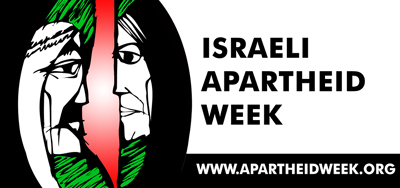 It is also true that the BDS movement aims to build awareness of Israel as a rogue state. Israel was established in 1948 by forcibly displacing the overwhelming majority of Palestine’s indigenous Arab population from their homeland. Today, Palestinian refugees are prevented from returning to our homes and lands from which they were expelled. In contrast, any person who claims Jewish descent from anywhere in the world may become an Israeli citizen under the so-called Law of Return. Israel defines itself as a Jewish state, not a state of all its citizens. This is apartheid, and is sustained through an elaborate system of laws, policies, and practices that discriminate openly against Palestinian citizens of the state (of course within the apartheid logic their identity is denied and they are called Arab-Israelis, not Palestinian). All of these points are well-documented and understood by Palestinians, international human rights experts, and those with an intimate experience of South African apartheid.4
It is also true that the BDS movement aims to build awareness of Israel as a rogue state. Israel was established in 1948 by forcibly displacing the overwhelming majority of Palestine’s indigenous Arab population from their homeland. Today, Palestinian refugees are prevented from returning to our homes and lands from which they were expelled. In contrast, any person who claims Jewish descent from anywhere in the world may become an Israeli citizen under the so-called Law of Return. Israel defines itself as a Jewish state, not a state of all its citizens. This is apartheid, and is sustained through an elaborate system of laws, policies, and practices that discriminate openly against Palestinian citizens of the state (of course within the apartheid logic their identity is denied and they are called Arab-Israelis, not Palestinian). All of these points are well-documented and understood by Palestinians, international human rights experts, and those with an intimate experience of South African apartheid.4
Today, the West Bank is surrounded by an apartheid wall and Palestinians are being rounded into ever smaller ghettos. Literally the earth is shrinking and closing down on us wherever we are – simply for the crime of being stateless Palestinians. In Lebanon, Palestinian refugees are still barred from seventy-one professions. On the borders of Iraq, there are Palestinian refugees stranded in the desert with no country willing to accept them. The fundamental cause of these abuses is an inability to return to our homes. One does not cease to be Palestinian when outside the borders of the occupied territories. After trying every possible path to achieve our basic human rights (from armed struggle to negotiations), it is clearer today more than ever that what is needed is a movement to isolate Israeli Apartheid in the manner of South African apartheid. Since the so called ‘international community’ seems to be oblivious to the conditions that Palestinians are living in (conditions that the most imaginative of science fiction writers could not predict), the only option left is to make a pariah state of Israel for its crimes until it feels the necessity to comply with international law. Boycotts, Divestments and Sanctions are a legitimate tool in this strategy – they help to educate about Israeli crimes against Palestinians and, more importantly, they move people beyond basic condemnation to effective action.
Grassroots Versus Top-down
The Reut report is also correct when it claims that:
“While Israel works ‘from the center to the periphery’ or ‘top-down,’ [the delegitimization networks] work ‘from the periphery to the center’ and ‘bottom-up.’ While Israel emphasizes formal state-to-state relations with political and business elites, delegitimizers focus on non-governmental organizations, academia, grassroots movements, and the general public.”
Yes, the BDS movement does work on the grassroots level. That is what movements for social justice have historically done and certainly how the movement against South African apartheid was organized. The fight against apartheid in South Africa was not initiated by politicians – as a matter of fact, most officials supported apartheid until it became untenable for them to do so. It was the average person who pushed for BDS in their unions, schools, places of work, and places of worship that created this mass pressure.
On the other hand, Israel does naturally find allies at the state-to-state level (as the Reut Institute acknowledges). This is a partial explanation of why Israeli Apartheid Week in Canada was denounced by official government bodies. Just last week, when the Conservative Member of the Ontario Legislature, Peter Shurman, put forward a motion condemning the week in the provincial parliament, the motion was passed. MPP Shurman stated that the term apartheid is “poisonous” and “odious.” For the second year running, Liberal party leader Michael Ignatieff spoke out against the week saying “Israeli Apartheid Week is part of a global campaign of calls for divestment, boycotts and proclamations, and it should be condemned unequivocally and absolutely.” In the House of Commons, a motion was put forward that stated:
“This House considers itself to be a friend of the State of Israel … [and] is concerned about expressions of anti-Semitism under the guise of “Israeli Apartheid Week” … [and] explicitly condemns any action in Canada as well as internationally that would equate the State of Israel with the rejected and racist policy of apartheid.”
Using the term anti-Semitism in this context is nothing but a smear tactic with no factual evidence to support it. From its inception, the BDS movement and Israeli Apartheid Week activities have been explicitly rooted in universal values and principles. The BDS Call categorically rejects all forms of racism, racial discrimination and colonial oppression. What these elite-level condemnations show, however, is that Israeli apartheid does indeed have strong “formal state-to-state relations with the political and business elite” in Canada. The interests of these elites coincide in their support of colonial oppression in the Middle East. Otherwise, it is puzzling why, in the midst of a severe economic crisis, Canadian parliaments choose to debate an educational week on university campuses. Why is it essential for politicians across the spectrum to denounce the use of the term apartheid? Since when is it the business of politicians to censor what terms citizens can and cannot use to describe another state?
There is nothing ‘poisonous’ about using a legal term and debating factual matters regarding a state with a long record of human rights violations. There have been many excellent articles written about the use of the term apartheid (both for legal and comparative reasons), and endless quotes have been circulated by prominent academics and many South African activists making the comparison.5 The issue here is why such unwarranted hysteria over a week of educational events organized on a university campus by students? Canadian politicians seem to have gained a strong interest in student activism because of IAW, but are not nearly as interested in passing motions when it comes to addressing the state of the educational system or the prohibitive fees that students are expected to pay.
According to a B’nai Brith press release issued on the 25th of February 2010, congratulating the Ontario Legislature for passing the pro-Israel motion, they hope “today’s resolution is an important first step toward what must be an outright ban of ‘Israel Apartheid Week’.” This is the dilemma faced by the supporters of Israeli apartheid – to be a friend of Israel means to support the Canadian state in censoring its own people. The apartheid logic does not only exist within the borders of Israel (yet undefined), but spills into the international arena to states that see themselves as natural allies of Israel. The fact that the Ontario Legislative Assembly would deem it important to defend Israel’s human rights record speaks volumes about the nature of Canadian politics. In this manner, the grassroots work of the BDS movement inevitably grows to encompass questions of free speech and the need to defend democratic spaces in Canada from the repressive intervention of legislative bodies.
Whether these resolutions are, indeed, preparations for a full banning of IAW remains to be seen. However, the severity of the attack is an admission that IAW is effective in reaching a wide audience and in exposing apartheid Israel. Israeli Apartheid Week is growing exponentially each year. This year it hit a record number of 60 cities around the world. The arguments about Israel being an apartheid state are being heard. The condemnations from these official state bodies in Canada only puts them at odds with the move toward the recognition in international law by human rights agencies in the Middle East of the abuses of Palestinians by the Israeli state as, in fact, posed by the BDS movement.
Dealing with the “Hubs”
In their document, the Reut Institute specifically describes what they call ‘hubs of delegitimization’ and ‘catalysts’ within these hubs:
“Hubs are units of the network that have extraordinary influence on the values, priorities, and patterns of conduct of the network due to a very high number of links to other units; Catalysts are units of the network that dedicate themselves to its cause by mobilizing financial and human resources, collecting information and turning it into knowledge, developing the ideology, and serving as its organizing and orchestrating engine.”
The report then advises that Israel must focus “on the hubs of delegitimization such as London, Toronto, Madrid, or the Bay Area and undermining its catalysts.” To re-interpret the jargon of state security operatives, the report is saying Israel must focus on cities where the BDS movement is strong and try to attack key activists to stop them doing the work they do. There is nothing new in this for Israel (and it continues to carry out in violation of international law any number of extra-territorial actions in defence of Zionism). The apartheid logic does not remain contained within Israel’s borders. Israel, in order to maintain its apartheid system, must attack anyone that is successful in exposing it. The Reut document states clearly that “Israel is faced with a potentially existential threat, and must treat it as such by focusing its intelligence agencies, allocating appropriate resources, developing new knowledge, designing a strategy, and executing it.” The logic of the defence of an apartheid state, as in the case of South Africa, leads to a ratcheting up of repression.
The Reut Institute report also urges Israel to cultivate its own networks and catalysts. All indications suggest that they are failing hopelessly at this task. This year’s attempts by the pro-apartheid camp to undermine Israeli Apartheid Week were breathtakingly stupid. At the top of the list would have to be Israel’s infamous “Size Doesn’t Matter” campaign: if all Israel has to defend its actions are pictures of beaches, women in bikinis, and thinly veiled references to male organs – they are in deep trouble. The pro-Israeli students egged on to confront IAW activists and speakers show an utter lack of initiative or ability to think for themselves. In any debate, they simply recited a list of five questions they have been taught to ask seemingly without any knowledge of the region or critical capacity to engage actively in argument. In contrast, BDS student activists are producing inspiring posters and music, organizing creative actions, building solidarity with other struggles for social justice. One can hardly blame the pro-Israel students though – it is an unpleasant and impossible task to support apartheid and make it look aesthetically pleasing at the same time.
This year marks five years since the BDS call from Palestine. The successes have been plenty and the movement is gaining momentum. The fact that a report urges Israel to consider this movement an existential threat means the campaign is hitting a nerve in the apartheid psyche. Israel is not used to fighting non-military battles. But it seems they want to bring a different type of fight to the “hubs.” In true Israeli fashion the Reut institute has already mentioned the term “sabotage” and the use of “intelligence agencies” as way to harass the growing Palestinian solidarity movement and the BDS campaign. But we know we are on the right side of this struggle. So from the Toronto hub of ‘Israel delegitimization,’ we say “yalla bring it.” •
Endnotes
- See “The Delegitimization Challenge: Creating a Political Firewall,” (retrieved March 2, 2010). The Reut Institute focuses on providing strategic support to the Israeli state, often around its ‘national security’ concerns.
- Palestinian United Call for BDS against Israel.
- Call for Academic and Cultural Boycott of Israel.
- For a detailed report on this see United Against Apartheid, Colonialism and Occupation.
- Ibid.


